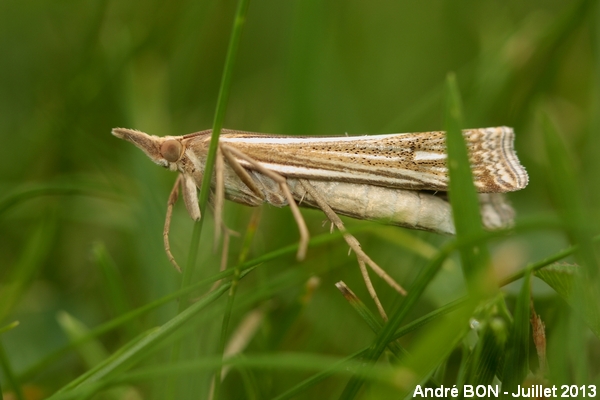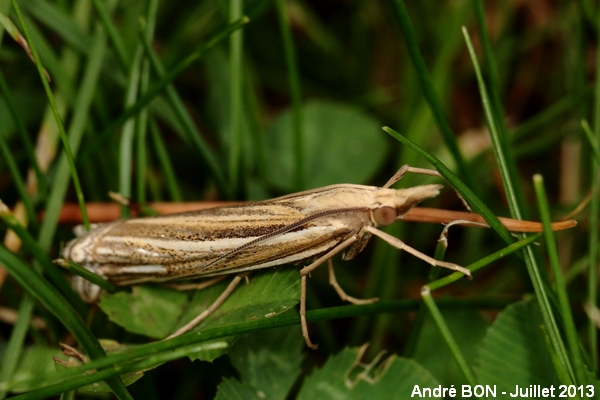

| Scarce Striped Grass-veneer (Ancylolomia tentaculella (Hübner, 1796)) |


|
|
Scientific name: Ancylolomia tentaculella (Hübner, 1796) Common name: Scarce Striped Grass-veneer French name: Crambus tentaculé, Ancylolome commun. Order: Lepidoptera Suborder: Heterocera Family: Crambidae Subfamily: Crambinae Wingspan: 30-39 mm. Females are slightly larger than males. Biotope: Grassy slopes, waste lands and areas with high grasses. Geographic area: Southern and central Europe, Anatolia, Middle-East. Flight time: June to September. Number of generations : Caterpillar: Whitish with brown head and upper side of the thorax. Host plant: Various Graminae and in particular those of the Dactylis genus. Caterpillars feed at the base of plants where they shelter inside a silken tube. |
The Scarce Striped Grass-veneer is a rather large size Crambidae with globally striped wings. The fore wings are greyish brown with three white longitudinal stripes. There is a first one close to the inner edge and parallel to a second one located in the middle of the wing. These two stripes diverge from a third one located close to the costal edge. The submarginal area bears small white streaks between the white stripe close to the costal edge and the middle stripe. You can distinguish a slightly larger white marking interrupted in its middle by a dark spot. The marginal area is rather typical with three brown lines parallel to the margin. The middle line is jagged. The hind wings are greyish white. The similar species Ancylolomia disparalis, rather found in the southern regions, shows a white marking not extending beyond the dark sport towards the base of the wing. Males of Ancylolomia palpella, species also mainly found in the southern regions, are the only among the three species of this genus found in France to have very feathery antennae. |
| [To know more about the Scarce Striped Grass-veneer] [Next picture] [Top] |

|
The striped fore wings and the lines in the marginal area clearly indicate the Ancylolomia genus. The region of the observation and the white marking extending beyond the dark spot towards the base are criteria for the Scarce Striped Grass-veneer species. |
| [To know more about the Scarce Striped Grass-veneer] [Previous picture] [Top] |

|
You can clearly see that the antennae are not feathery. Is it possible to know if this one is a male or a female based on this picture only? |